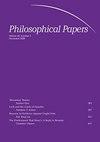Conversations about Taste, Contextualism, and Non-Doxastic Attitudes
IF 1.3
3区 哲学
0 PHILOSOPHY
引用次数: 12
Abstract
Abstract It is sometimes argued that conceptualism cannot explain (dis)agreements concerning matters of personal taste because it treats sentences involving predicates of taste as indexical. I aim to weaken this charge. Given the idea that people sometimes use indexical sentences to express (dis)agreements about taste, two kinds of (dis)agreement are distinguished, namely doxastic and non-doxastic. Taste (dis)agreements are better explained in terms of the later kind, in which case they become amenable to contextualist treatment. It is argued that if something instantiates a taste property (like being tasty for A), it has to instantiate a corresponding attitudinal property (like being liked by A). Based on this, utterances of taste sentences express propositions that concern tastiness of something (e.g., that X is tasty for A) and these propositions entail other propositions that concern non-doxastic attitudes the speakers bear toward something (e.g., that X is liked by A). One speaker is claimed to (dis)agree with another speaker provided their respective entailed propositions feature (in)compatible non-doxastic attitudes. Although this explanation is similar to hybrid accounts that are currently growing in popularity, it departs from them in some notable respects.关于品味、语境主义和非武断态度的对话
人们有时认为,概念主义不能解释(不)关于个人品味问题的一致意见,因为它将涉及品味谓词的句子视为索引。我的目标是削弱这种指控。考虑到人们有时会使用索引句来表达对口味的不一致,我们将索引句区分为两种不一致,即歧异句和非歧异句。口味(不)一致在后一种情况下可以得到更好的解释,在这种情况下,它们可以接受情境主义的治疗。有人认为,如果某物实例化了一种味道属性(比如对a来说是美味的),它就必须实例化相应的态度属性(比如被a喜欢)。基于此,味觉句子的话语表达了与某物的味道有关的命题(例如,X对a来说是美味的),这些命题引发了其他与说话者对某物的非对立态度有关的命题(例如,一个说话者被要求(不)同意另一个说话者,前提是他们各自的隐含命题具有(不)相容的非对立态度。尽管这种解释与目前越来越流行的混合账户相似,但它在一些值得注意的方面有所不同。
本文章由计算机程序翻译,如有差异,请以英文原文为准。
求助全文
约1分钟内获得全文
求助全文
来源期刊

Philosophical Papers
PHILOSOPHY-
CiteScore
2.10
自引率
0.00%
发文量
18
期刊介绍:
Philosophical Papers is an international, generalist journal of philosophy edited in South Africa Original Articles: Articles appearing in regular issues are original, high-quality, and stand-alone, and are written for the general professional philosopher. Submissions are welcome in any area of philosophy and undergo a process of peer review based on initial editor screening and refereeing by (usually) two referees. Special Issues: Topic-based special issues are comprised of both invited and submitted papers selected by guest editors. Recent special issues have included ''Philosophy''s Therapeutic Potential'' (2014, editor Dylan Futter); ''Aging and the Elderly'' (2012, editors Tom Martin and Samantha Vice); ''The Problem of the Criterion'' (2011, editor Mark Nelson); ''Retributive Emotions'' (2010, editor Lucy Allais); ‘Rape and its Meaning/s’ (2009, editor Louise du Toit). Calls for papers for upcoming special issues can be found here. Ideas for future special issues are welcome.
 求助内容:
求助内容: 应助结果提醒方式:
应助结果提醒方式:


